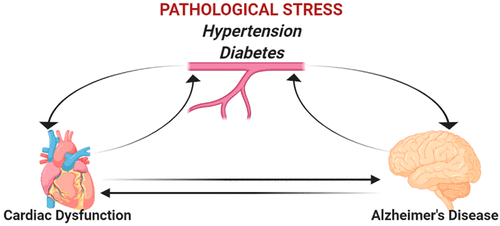当前位置:
X-MOL 学术
›
ACS Pharmacol. Transl. Sci.
›
论文详情
Our official English website, www.x-mol.net, welcomes your feedback! (Note: you will need to create a separate account there.)
The Brain–Heart Axis: Alzheimer’s, Diabetes, and Hypertension
ACS Pharmacology & Translational Science Pub Date : 2019-12-17 , DOI: 10.1021/acsptsci.9b00091 Andrew S. Riching 1, 2 , Jennifer L. Major 1, 2 , Pilar Londono 3 , Rushita A. Bagchi 1, 2
ACS Pharmacology & Translational Science Pub Date : 2019-12-17 , DOI: 10.1021/acsptsci.9b00091 Andrew S. Riching 1, 2 , Jennifer L. Major 1, 2 , Pilar Londono 3 , Rushita A. Bagchi 1, 2
Affiliation

|
Alzheimer’s disease (AD) is a debilitating neurodegenerative disorder affecting millions worldwide. Currently, there are only four approved treatments for AD, which improve symptoms modestly. AD is believed to be caused by the formation of intercellular plaques and intracellular tangles in the brain, but thus far all new drugs which target these pathologies have failed clinical trials. New research highlights the link between AD and Type II Diabetes (T2D), and some believe that AD is actually a brain specific form of it termed Type III Diabetes (T3D). Drugs which are currently approved for the treatment of T2D, such as metformin, have shown promising results in improving cognitive function and even preventing the development of AD in diabetic patients. Recent studies shed light on the relationship between the brain and cardiovascular system in which the brain and heart communicate with one another via the vasculature to regulate fluid and nutrient homeostasis. This line of research reveals how the brain–heart axis regulates hypertension and diabetes, both of which can impact cognitive function. In this review we survey past and ongoing research and clinical trials for AD, and argue that AD is a complex and systemic disorder which requires comprehensive approaches beyond the brain for effective prevention and/or treatment.
中文翻译:

脑心轴:阿尔茨海默氏病,糖尿病和高血压
阿尔茨海默氏病(AD)是一种令人衰弱的神经退行性疾病,影响着全球数百万人。目前,只有四种批准的AD治疗,可适度改善症状。人们认为AD是由大脑中细胞间斑块和细胞内缠结的形成引起的,但是迄今为止,针对这些病理的所有新药都未能通过临床试验。新的研究强调了AD与II型糖尿病(T2D)之间的联系,有人认为AD实际上是大脑的特定形式,称为III型糖尿病(T3D)。目前被批准用于治疗T2D的药物(如二甲双胍)在改善糖尿病患者的认知功能甚至预防AD的发展方面显示出可喜的结果。最近的研究揭示了大脑与心血管系统之间的关系,在该系统中,大脑和心脏通过脉管系统相互沟通,以调节体液和营养素的体内平衡。这一系列研究揭示了脑心轴如何调节高血压和糖尿病,这两者都会影响认知功能。在这篇综述中,我们调查了AD的过去和正在进行的研究以及临床试验,并认为AD是一种复杂的系统性疾病,需要有效的预防和/或治疗手段,而不仅仅是大脑。
更新日期:2019-12-18
中文翻译:

脑心轴:阿尔茨海默氏病,糖尿病和高血压
阿尔茨海默氏病(AD)是一种令人衰弱的神经退行性疾病,影响着全球数百万人。目前,只有四种批准的AD治疗,可适度改善症状。人们认为AD是由大脑中细胞间斑块和细胞内缠结的形成引起的,但是迄今为止,针对这些病理的所有新药都未能通过临床试验。新的研究强调了AD与II型糖尿病(T2D)之间的联系,有人认为AD实际上是大脑的特定形式,称为III型糖尿病(T3D)。目前被批准用于治疗T2D的药物(如二甲双胍)在改善糖尿病患者的认知功能甚至预防AD的发展方面显示出可喜的结果。最近的研究揭示了大脑与心血管系统之间的关系,在该系统中,大脑和心脏通过脉管系统相互沟通,以调节体液和营养素的体内平衡。这一系列研究揭示了脑心轴如何调节高血压和糖尿病,这两者都会影响认知功能。在这篇综述中,我们调查了AD的过去和正在进行的研究以及临床试验,并认为AD是一种复杂的系统性疾病,需要有效的预防和/或治疗手段,而不仅仅是大脑。


























 京公网安备 11010802027423号
京公网安备 11010802027423号